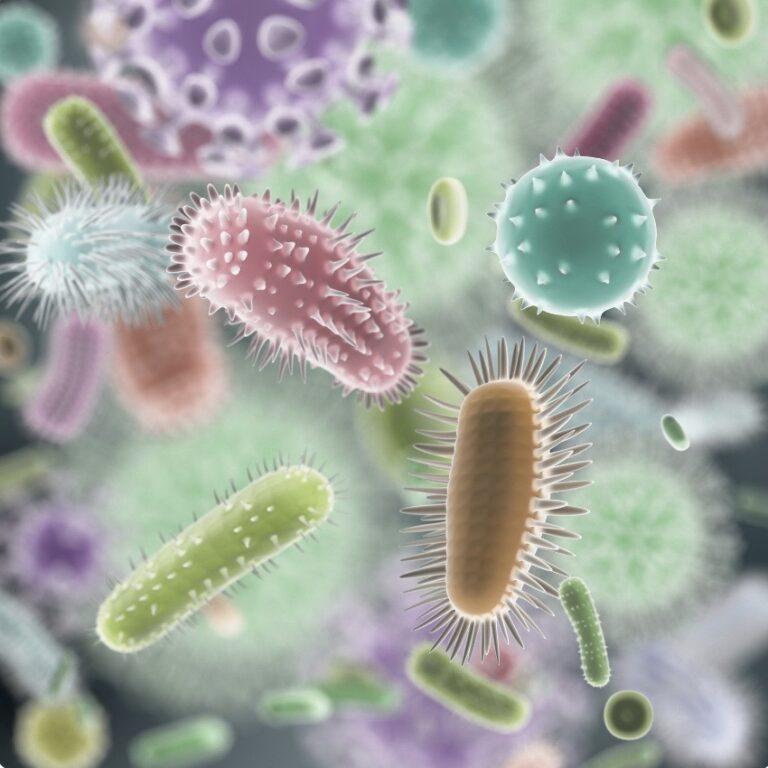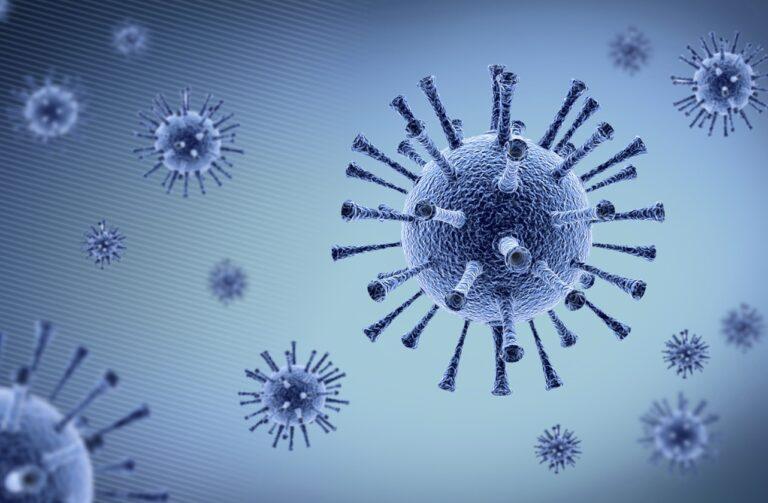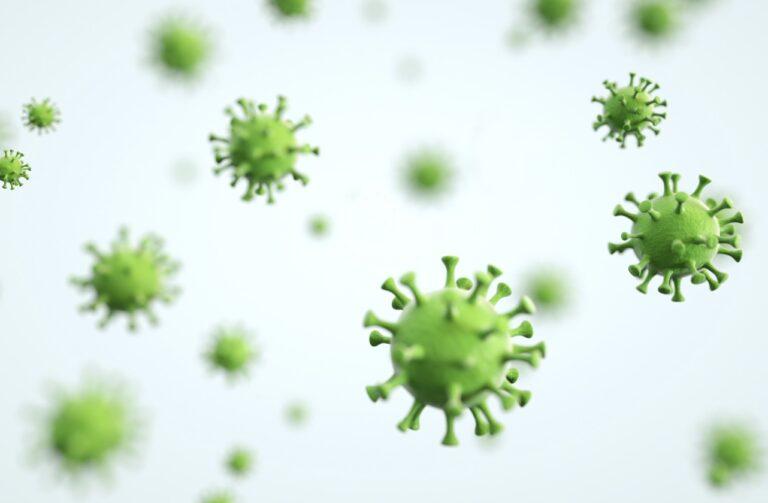
Many different viruses can affect humans. In fact, there are trillions of them! The most well-known virus infection is COVID-19 caused by SARS-CoV-2 (severe acute respiratory syndrome coronavirus 2). COVID-19 was declared a pandemic by the World Health Organization (WHO) in March 2020 threatening public health globally.
Today we’re going to focus on three specific examples of viruses: rhinovirus, varicella-zoster virus and the influenza virus, which cause the common cold, chicken pox and the flu. Each one is unique in its own way and some of them can cause serious health problems if left untreated. Keep reading to learn more about these common viral infections.
What are viruses?
Viruses are small infectious particles, they are not living organisms. They can only grow when they’re in contact with living cells. They come in very different shapes: spherical (icosahedral), rods (helical) and enveloped (the outer shell covered in a baggy membrane, which can change shape). There are many different types of viruses. Some are harmless and cause the common flu, while others cause more serious conditions such as HIV.
Viruses are unable to replicate on their own. They need living hosts such as the human body. The virus looks for different cells in the body e.g. liver, blood or the respiratory system, depending on the type of virus it is. It enters a living host cell and takes over the cell’s processes for making new genetic material (RNA or DNA) and proteins. The viral genetic material is copied and new viral genetic material and proteins are made. These components assemble into new variants which escape from the cell. Some types of viruses cause the complete breakdown of the cell. Other types of viruses leave by pushing through the cell membrane. Both methods damage the cells causing disease.
How does your body respond to viral infection?
When a person is infected with a virus, their immune system begins to produce antibodies in response. Antibodies are proteins that recognise and bind to foreign invaders, such as viruses. This binding helps to neutralise the virus and prevent it from infecting cells.
The immune system also produces specialised cells, known as memory cells. Memory cells remain in the body after an infection has cleared and help to protect against future infections with the same virus. When a person is vaccinated, their body is exposed to a weakened form of the virus. This exposure stimulates the immune system to produce antibodies and memory cells. As a result, the person is immune to future infection with the virus.
In some cases, the immune response is able to clear the virus from the body entirely. However, in other cases the virus is able to replicate and cause infectious diseases. The body’s response to viral infection depends on a number of factors, including the individual’s immune system strength, health conditions and the specific type of virus. In general however, the immune system is typically able to mount an effective response against most viral infections.
Unlike bacterial infections, viral diseases don’t respond to antibiotics. People will need either a vaccination to prevent infection or antiviral drugs to treat any symptoms. Sometimes the only option is symptom relief.
How do viral diseases spread?
- Droplets are expelled during coughs/sneezes
- Close contact with an infectious person (a handshake could transmit germs)
- Touching your nose, mouth or eyes after contact with an infected surface (while handling groceries for example – then proceeding on to other tasks without washing hands thoroughly beforehand)
- Contact with infected body fluids through kissing, sex, urine or faeces
- Contact with infected animals or insects such as fleas, ticks or mosquitoes e.g. dengue fever
- Transmission from mother to child during birth
Chickenpox
The Varicella-Zoster virus is a highly contagious virus that causes chickenpox and lasts typically about two weeks. The virus is spread through contact with respiratory secretions or direct contact with the blisters of an infected person. Symptoms of chickenpox include fever, fatigue and a rash of itchy blisters. The rash typically appears first on the face, chest and back and then spreads to the rest of the body. Chickenpox is usually mild, but it can be severe in some cases. Complications from chickenpox can include pneumonia, encephalitis and Reye’s syndrome.
Once a person has chickenpox the virus remains dormant in their body for years. However, the virus can reactivate later in life, causing a condition called shingles. It can be activated due to stress or certain conditions. Shingles is a painful rash that typically appears on one side of the body. The rash is often accompanied by fever, body aches and fatigue. Treatment for shingles includes antiviral medications and pain relief medications. In most cases symptoms resolve within two to four weeks. However, some people may experience long-term complications from shingles, such as chronic pain or nerve damage. Vaccination is the best way to prevent chickenpox and shingles. The Varicella-Zoster vaccine is safe for children and adults who have not had chickenpox before. The vaccine is typically given in two doses, with the second dose given four to eight weeks after the first dose.
The chickenpox vaccine is available through the NHS to people who are at risk of harming someone with a weakened immune system e.g. a child who has a parent receiving chemotherapy. Private clinics provide chickenpox vaccines at a cost.
Common cause
The respiratory disease known as the common cold is caused by a rhinovirus, of which there are many strains. Other viruses that can cause colds include a respiratory syncytial virus, human parainfluenza viruses, adenovirus, common human coronaviruses and human metapneumovirus.
The name rhinovirus comes from the Greek, with ‘rhino’ meaning nose. These viruses are airborne and transmitted person to person by respiratory droplets, for example when an infected individual sneezes or coughs. Once inhaled, the virus replicates in the epithelial cells of the upper respiratory tract. Symptoms include a runny nose, nasal congestion, sneezing and a sore throat. They generally last for around a week and whilst most people recover without any complications, for some, such as the elderly or immunocompromised, they can lead to more serious respiratory problems such as pneumonia. There is no specific cure for the common cold and currently no vaccine exists to prevent its spread. Treatment focuses on relieving symptoms until the virus has run its course. So next time you feel a cold coming on, remember, you’ve got a rhinovirus!
Influenza
The symptoms of the flu are caused by the influenza virus, which is classed as a human respiratory pathogen. The virus is divided into two main subtypes, Human influenza A and B viruses. Both of these subtypes are capable of causing the flu, but influenza A is generally more virulent.
The flu is typically spread through contact with respiratory secretions, such as saliva, mucus or blood from an infected person. The virus can also be spread through contact with contaminated surfaces, such as doorknobs or countertops. Once the virus enters the body, it begins to replicate in the upper respiratory tract. This replication process causes the symptoms of the flu, which include sudden fever, chills, coughing and muscle aches. In severe cases the virus can lead to pneumonia, which can be fatal.
Treatment for the flu typically involves rest and fluids. In severe cases, antiviral medications may be prescribed. These medications can help to shorten the duration of the illness and reduce the severity of symptoms. However, they must be started within 48 hours of symptom onset to be effective.
Prevention of the flu is typically accomplished through vaccination. Vaccination helps to stimulate immunity against the influenza virus and is recommended for all people over the age of six months.
Other diseases caused by viruses
- Ebola is caused by the Ebola virus
- Hepatitis B
- Hepatitis C
- Polio
- Mumps
- Rabies is caused by the rabies virus
- Human papillomavirus (HPV)
- Viral meningitis
- Genital herpes
- MERS (Middle East Respiratory Syndrome)
Viruses are an unavoidable part of life, but that doesn’t mean you have to suffer from their effects. There are treatments available for a variety of viruses. If you think you may be infected it’s important to seek medical advice. Stay informed and consult your healthcare professional to get the best advice and treatment for viral infections.
Sources
Medical Disclaimer
NowPatient has taken all reasonable steps to ensure that all material is factually accurate, complete, and current. However, the knowledge and experience of a qualified healthcare professional should always be sought after instead of using the information on this page. Before taking any drug, you should always speak to your doctor or another qualified healthcare provider.
The information provided here about medications is subject to change and is not meant to include all uses, precautions, warnings, directions, drug interactions, allergic reactions, or negative effects. The absence of warnings or other information for a particular medication does not imply that the medication or medication combination is appropriate for all patients or for all possible purposes.








